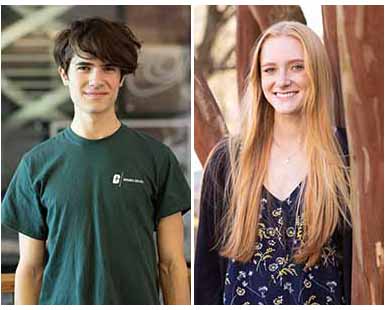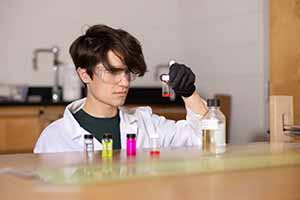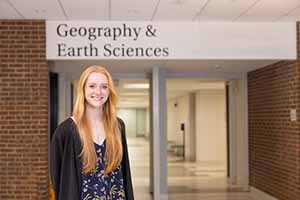
Two outstanding UNC Charlotte Honors College juniors have been nominated for the 2024 Barry Goldwater Scholarship, considered one of the top awards for undergraduate U.S. STEM students. The scholarship helps identify the next generation of leaders in scientific, mathematical and engineering research, funding up to $7,500 annually for their education.
“We are excited to nominate two UNC Charlotte students for the Goldwater Scholarship,” said Andrew Keener, scholars advisor in the Honors College who assists UNC Charlotte students pursuing nationally competitive scholarships. “"Their commitment to research, from high school to the undergraduate level, is impressive. If they are selected as awardees, this scholarship would help them continue their educational journey and advance scientific knowledge."
 Juliusz Wieckowski, from Charlotte, is in the Chemistry Honors program in the College of Science. His passion for chemistry began with his first chemistry class at Ardrey Kell High School.
Juliusz Wieckowski, from Charlotte, is in the Chemistry Honors program in the College of Science. His passion for chemistry began with his first chemistry class at Ardrey Kell High School.
“It absolutely blew my mind learning about subatomic particles — you take a noble gas, you add a proton, and you get a highly reactive metal. Bismuth is element 83 on the periodic table and is an ingredient in Pepto Bismol, but if you take just one proton and add it to bismuth you actually get polonium, one of the most dangerous elements on the periodic table.”
From there, Wieckowski was hooked, and he studied the properties of the elements, knowing that science and research would be his career path.
At Charlotte, Wieckowski has capitalized on undergraduate research opportunities to study bacteria and ways to stop their spread without antibiotics. As bacteria build resistance to available antibiotics, scientists are exploring alternative ways to thwart infections.
“You don’t kill a bacteria or a population of bacteria, you basically try to eliminate their capacity to infect. If you can interfere with the structure of how the bacterium infects the host, without killing it, its capacity to infect could be neutralized,” said Wieckowski.
Wieckowski studied Campylobacter jejuni, which can cause foodborne illnesses. He and a team of fellow researchers worked with Professor Jay Troutman and found a way to reorient one part of the glycoprotein, the long, hairlike structure that extends from the bacterium to infect a host cell. Changing the orientation of that part on the glycoprotein rendered the bacterium incapable of spreading, which could stop a bad case of gastroenteritis from ever starting.
Wieckowski spent a semester studying abroad in Spain and integrated his scientific knowledge into learning Spanish, by talking with someone who also worked in a lab. “I had only been exposed to English articles and research, so to speak about it in another language really expanded my mindset. I got to thinking about all the other incredibly fascinating research being published in other languages that I might not know about. Science is a collaborative effort. It’s also international. So finally speaking about it in another language was such a neat experience.”
 Mckenna Zelna came to UNC Charlotte as a student in the University Honors program, majoring in earth and environmental sciences in the College of Humanities & Earth and Social Sciences.
Mckenna Zelna came to UNC Charlotte as a student in the University Honors program, majoring in earth and environmental sciences in the College of Humanities & Earth and Social Sciences.
Zelna began ecological research as a junior at Middle Creek High School in Cary, North Carolina, for an Advanced Placement class. She was interested in a stream that had some nearby construction, so Zelna took samples from the watershed to look for macroinvertebrates.
“Macroinvertebrates are great bioindicators of water quality; many macroinvertebrates can’t survive in pollution. National organizations have grouped macroinvertebrates based on their levels of sensitivity to pollutants. So, I was pulling bugs out of the stream that I studied to rate them,” explained Zelna.
She tested stream samples in the fall, winter and spring, and when she noticed a consistently low trend in quality, she found the source in some local construction. “They had cut down trees, but it left a lot of leaves and organic matter, which then decayed and impacted the water quality.”
Thanks to those AP classes, Zelna enrolled with enough credits to begin science classes for her major as a freshman. This semester, Zelna is working in Research Assistant Professor Drew Syverson’s geochemistry lab, studying hydrothermal plumes on mid-ocean ridges. The ocean is full of vents emitting warm gases and fluids. Those vents emit trace metals like iron in clouds of particulates, and they’re studying how the metals may settle on the ocean floor or mix with seawater, which could impact ocean cycles.
Zelna also competed for two seasons as a walk-on with the Charlotte 49ers volleyball team. She applies lessons from her time playing volleyball to her approach working with fellow researchers in labs.
“Volleyball taught me great lessons about time management, teamwork, communication and collaboration. It really introduced me to that deeper level of teamwork in collaborative settings,” Zelna said. This summer, she will join another team with an internship at Plant Delights, a botanical research facility that tracks pollinators and researches bloom patterns and fertilizer effectiveness.
The Barry M. Goldwater Scholarship and Excellence in Education Program was established by Congress in 1986 to honor the lifetime work of its namesake who represented Arizona in the U.S. Senate from 1969 to 1987.
UNC Charlotte was home to 14 national scholarship and fellowship student awardees during the 2022-23 academic year, including Fulbright, Gilman and Goldwater. The Honors College advises all undergraduate students who are applying for nationally competitive scholarships